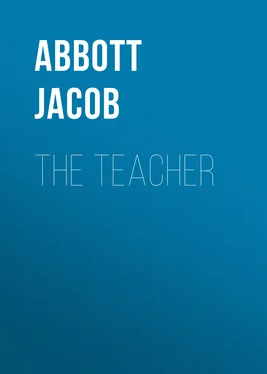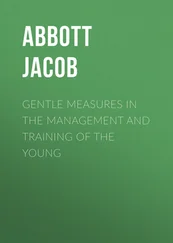Jacob Abbott - The Teacher
Здесь есть возможность читать онлайн «Jacob Abbott - The Teacher» — ознакомительный отрывок электронной книги совершенно бесплатно, а после прочтения отрывка купить полную версию. В некоторых случаях можно слушать аудио, скачать через торрент в формате fb2 и присутствует краткое содержание. Жанр: foreign_edu, pedagogy_book, на английском языке. Описание произведения, (предисловие) а так же отзывы посетителей доступны на портале библиотеки ЛибКат.
- Название:The Teacher
- Автор:
- Жанр:
- Год:неизвестен
- ISBN:нет данных
- Рейтинг книги:5 / 5. Голосов: 1
-
Избранное:Добавить в избранное
- Отзывы:
-
Ваша оценка:
- 100
- 1
- 2
- 3
- 4
- 5
The Teacher: краткое содержание, описание и аннотация
Предлагаем к чтению аннотацию, описание, краткое содержание или предисловие (зависит от того, что написал сам автор книги «The Teacher»). Если вы не нашли необходимую информацию о книге — напишите в комментариях, мы постараемся отыскать её.
The Teacher — читать онлайн ознакомительный отрывок
Ниже представлен текст книги, разбитый по страницам. Система сохранения места последней прочитанной страницы, позволяет с удобством читать онлайн бесплатно книгу «The Teacher», без необходимости каждый раз заново искать на чём Вы остановились. Поставьте закладку, и сможете в любой момент перейти на страницу, на которой закончили чтение.
Интервал:
Закладка:
Still it is necessary to give pupils, sometimes, the opportunity to whisper and leave seats. Cases occur where this is unavoidable. It cannot therefore be forbidden altogether. How then, you will ask, can the teacher regulate this practice, so as to prevent the evils which will otherwise flow from it, without being continually interrupted by the request for permission?
By a very simple method. Appropriate particular times at which all this business is to be done, and forbid it altogether at every other time. It is well on other accounts to give the pupils of a school a little respite, at least every hour; and if this is done, an intermission of study for two minutes each time, will be sufficient. During this time, general permission should be given to speak or to leave seats, provided they do nothing at such a time to disturb the studies of others. This has been my plan for two or three years, and no arrangement which I have ever made, has operated for so long a time, so uninterruptedly, and so entirely to my satisfaction as this. It of course will require some little time, and no little firmness, to establish the new order of things, where a school has been accustomed to another course; but where this is once done, I know no one plan so simple and so easily put into execution, which will do so much towards relieving the teacher of the distraction and perplexity of his pursuits.
In making the change, however, it is of fundamental importance that the pupils should themselves be interested in it. Their cooperation, or rather the cooperation of the majority, which it is very easy to obtain, is absolutely essential to success. I say this is very easily obtained. Let us suppose that some teacher, who has been accustomed to require his pupils to ask and obtain permission, every time they wish to speak to a companion, is induced by these remarks to introduce this plan. He says accordingly to his school:
"You know that you are now accustomed to ask me whenever you wish to obtain permission to whisper to a companion, or to leave your seats: now I have been thinking of a plan which will be better for both you and me. By our present plan, you are sometimes obliged to wait before I can attend to your request. Sometimes I think it is unnecessary, and deny you, when perhaps I was mistaken, and it was really necessary. At other times, I think it very probable, that when it is quite desirable for you to leave your seat, you do not ask, because you think you may not obtain permission, and you do not wish to ask and be refused. Do you, or not, experience these inconveniences from our present plans?"
The boys would undoubtedly answer in the affirmative.
"I experience great inconvenience, too. I am very frequently interrupted when busily engaged, and it also occupies a great portion of my time and attention. It requires as much mental effort to consider and decide sometimes whether I ought to allow a pupil to leave his seat, as it would to decide a much more important question; therefore I do not like our plan, and I have another to propose."
The boys are all attention to know what the new plan is. It will always be of great advantage to the school, for the teacher to propose his new plans from time to time to his pupils in such a way as this. It interests them in the improvement of the school, exercises their judgment, establishes a common feeling between teacher and pupil, and in many other ways will assist very much in promoting the welfare of the school.
"My plan," continues the teacher, "is this:—to allow you all, besides the recess, a short time, two or three minutes perhaps, every hour;" (or every half hour, according to the character of the school, the age of the pupils, or other circumstances, to be judged of by the teacher,) "during which you may all whisper or leave your seats, without asking permission."
Instead of deciding the question of the frequency of this general permission, the teacher may, if he pleases, leave it to the pupils to decide. It is often useful to leave the decision of such a question to them. On this subject, however, I shall speak in another place. It is only necessary, here, to say, that this point may be safely left to them, since the time is so small which is to be thus appropriated. Even if they vote to have the general permission to whisper every half hour, it will make but eight minutes in the forenoon. There being six half hours in the forenoon, and one of them ending at the close of school, and another at the recess, only four of these rests , as a military man would call them, would be necessary; and four, of two minutes each, would make eight minutes. If the teacher thinks that evil would result from the interruption of the studies so often, he may offer the pupils three minutes rest every hour , instead of two minutes every half hour , and let them take their choice; or he may decide the case altogether himself.
Such a change, from particular permission on individual requests to general permission at stated times , would unquestionably be popular in every school, if the teacher managed the business properly. And by presenting it as an object of common interest,—an arrangement proposed for the common convenience of teacher and pupils, the latter may be much interested in carrying the plan into effect. We must not rely, however, entirely upon their interest in it . All that we can expect from such an effort to interest them, as I have described and recommended, is to get a majority on our side, so that we may have only a small minority, to deal with by other measures. Still we must calculate on having this minority, and form our plans accordingly , or we shall be sadly disappointed. I shall, however, in another place, speak of this principle of interesting the pupils in our plans, for the purpose of securing a majority in our favor, and explain the methods by which the minority is then to be governed. I only mean here to say, that, by such means, the teacher may easily interest a large proportion of the scholars, in carrying his plans into effect, and that he must expect to be prepared with other measures, for those, who will not be governed by these.
You cannot reasonably expect however, that immediately after having explained your plan, it will, at once, go into full and complete operation. Even those who are firmly determined to keep the rule, will, from inadvertence, for a day or two, make communication with each other. They must be trained , not by threatening and punishment, but by your good-humored assistance, to their new duties. When I first adopted this plan in my school, something like the following proceedings took place.
"Do you suppose that you will perfectly keep this rule, from this time?"
"No sir," was the answer.
"I suppose you will not. Some, I am afraid, may not really be determined to keep it, and others will forget. Now I wish every one would keep an exact account to day, of all the instances of speaking and leaving seats, out of the regular times, and be prepared to report them at the close of the school. Of course, I shall have no punishment for it; but it will very much assist you to watch yourselves, if you expect to make a report at the end of the forenoon. Do you like this plan?"
"Yes sir," was the answer, and all seemed to enter into it with spirit.
In order to mark more definitely the times for communication I wrote, in large letters, on a piece of pasteboard, "Study Hours," and making a hole over the centre of it, I hung it upon a nail, over my desk. At the close of each half hour, a little bell was to be struck, and this card was to be taken down. When it was up, they were, on no occasion whatever, (except some such extraordinary occurrence as sickness, or my sending one of them on a message to another, or something clearly out of the common course,) to speak to each other; but were to wait, whatever they wanted, until the Study Card , as they called it, was taken down.
Читать дальшеИнтервал:
Закладка:
Похожие книги на «The Teacher»
Представляем Вашему вниманию похожие книги на «The Teacher» списком для выбора. Мы отобрали схожую по названию и смыслу литературу в надежде предоставить читателям больше вариантов отыскать новые, интересные, ещё непрочитанные произведения.
Обсуждение, отзывы о книге «The Teacher» и просто собственные мнения читателей. Оставьте ваши комментарии, напишите, что Вы думаете о произведении, его смысле или главных героях. Укажите что конкретно понравилось, а что нет, и почему Вы так считаете.












